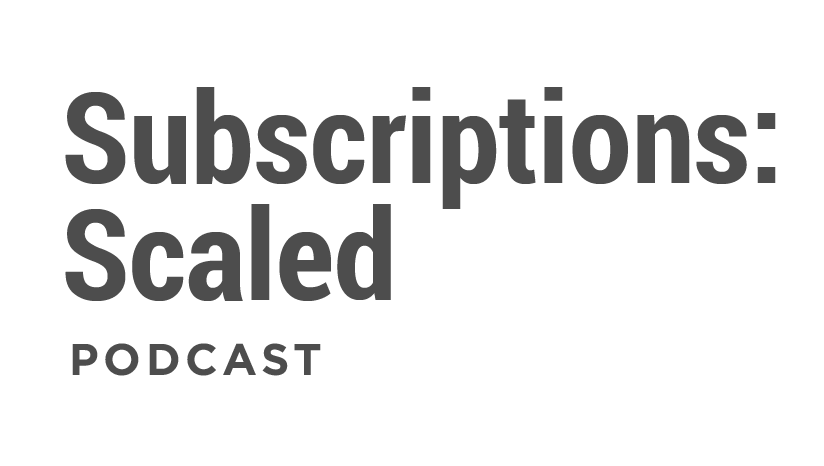Episode 28: Leveraging Data for Nutrition, Health, and Performance with Rachel Soper Sanders, CEO and Co-Founder at Rootine
In this episode of the Subscriptions: Scaled podcast, Nick Fredrick, President of Rebar Technology Solutions, is joined by Rachel Soper Sanders, CEO and Co-founder at Rootine.
What is Rooting?
Rootine is a two-year-old, consumer-driven, health and human performance company. Their mission is to enable users to leverage technology and personalized health data to plan and deliver customized micronutrient formulas and a path to optimal health and performance.
Why Rootine?
Rachel Soper Sanders comes to Rootine following a decade in the healthcare space, where she witnessed the effects of stress on health and performance, specifically related to sleep and nutrition. After connecting with Dr Daniel Wallerstorfer, they teamed up to bring a personalized service to the micro-nutrient and supplement market.
A Reimagined Approach
Rachel, an MBA, and Dr Wallerstorfer recognized the need for something beyond a one-size-fits-all approach. They imagined a data-driven, evidence-based service that brings the best of nutrition science and genetic research. As Rachel says, they are able to bring a “truly bespoke formula” to the consumer; a uniquely tailored formula and dosage based on genetics and lifestyle. Rootine takes pride in being able to deliver at a reasonable price and turnaround time.
Yet Rachel points out, “We don’t just offer you a physical product, we tell you what’s going on with your data.” Rootine boasts a platform allowing users to monitor performance, learn through targeted content, and build community and partnership opportunities.
Who Uses Rootine?
Rachel says that though 76% of the US already takes some sort of nutritional supplement, they’ve tended to attract those in the 30-50 age group. Rather than gender-specific, they’ve taken a psychographic approach. She points to high-performers: doctors, professional scientists, MBAs, and executives who are trying to optimize their performance on a daily basis. To date, they’ve reached most of their customers through paid social media, but are increasing their reach with content, community, and partnership opportunities.
Growing in a Challenging Time
Rachel points out that Rootine enjoyed five-fold growth in 2020, a year that was admittedly horrible for many suffering through the pandemic. And yet the trials of Covid-19 brought an increased focus on health and well-being.
She attributed this growth to “a variety of things that were going on externally” as well as focusing on their core values: human-first, evidence-based, and data-driven. The team at Rootine was able to “bring up some product launches earlier in 2020, than what we were originally anticipating, in order to help people get more insight and kind of manage through what they needed for the pandemic.” So, coming out of it, there are a whole number of new empowered health consumers that did not exist before the pandemic.
Finding and Keeping Customers
You can find Rootine on Twitter, Instagram, Facebook, as well as a blog, newsletter, and engaged email list. Partnership content is a feature and, according to Rachel, they have some interesting things upcoming with regard to outreach and education.
Building Trust with Privacy
In a time of concern with regard to data privacy and with respect to HIPAA, Rachel points out that they’ve been careful at Rootine to build flexibility into their platform. They protect data with the utmost care: they will not sell or share your data for profit.
The consumer is able to provide data from a wide variety of sources beyond those offered by Rootine. Besides the home testing they offer, wellness tests and DNA tests from third-party sources are usable. She emphasizes that they don’t require anything beyond the lifestyle assessment, and with that alone they are able to offer a unique product beyond those offered by others.
Operational Challenges
With such rapid growth, Nick and Rachel discuss the philosophy brought to adding resources, whether it be a vendor, partner, or supplier. Rachel says they approach human resource management, both internally and externally, by looking at culture and communication, and what that individual or vendor might bring to the table. Additionally, they look for those who are able to jump right in and keep up with the innovation.
What Should You Look Out For?
As Rootine is in its relatively early stages, Rachel offers some insights toward maintaining momentum. She points to resource management, namely time management, as a key factor.
With regard to the health and wellness solutions, testing is comprehensive and must be 110% correct. Yet with things like branding, websites, and messaging, you’re often pushed to make decisions with less than full information. She emphasizes that standing still in a start-up world is death. So in those cases, she will focus on customer feedback and data for answers. As she says, you have to get out there with the good to get to great.
To get started and learn more about Rootine and Rachel Soper Sanders, be sure to listen to the podcast and visit:
Rootine @ Twitter: https://twitter.com/rootine_co?s=20
Rachel Soper Sanders @ Twitter: https://twitter.com/rachelssanders?s=20
Rootine @ Instagram: https://www.instagram.com/rootine_co/?hl=en
Rachel Soper Sanders’ LinkedIn: https://www.linkedin.com/in/rachel-soper-sanders/
—
Ready to get started with Rebar?
Head to rebartechnology.com or email info@rebartechnology.com to schedule a call today.
